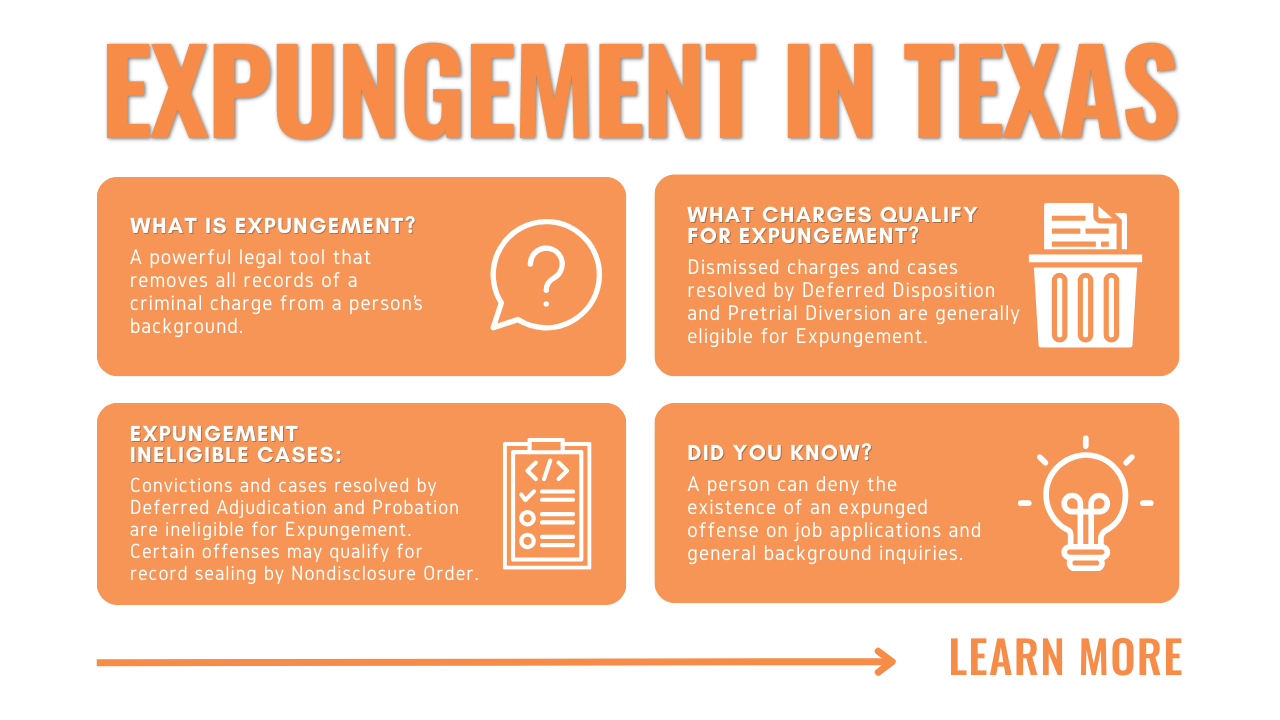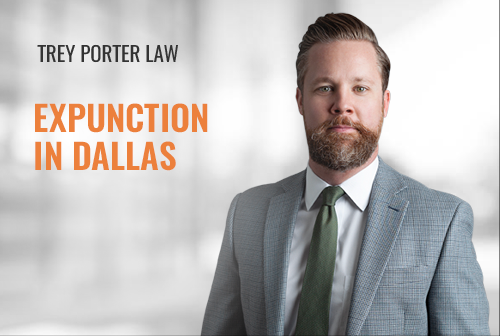HOW CAN I CLEAR MY CRIMINAL RECORD IN DALLAS?
A criminal record in Dallas can be cleared through the filing of an Expunction. An Expunction is a legal proceeding allowing individuals to remove certain dismissed cases from their criminal record. An Expunction destroys all records of the criminal charge and permits a person to deny the existence of the arrest and case. Learn more.
- How do I clear my case in Dallas? A criminal case in Dallas can be cleared through the legal process of Expunction, which destroys all records of an eligible criminal case including an arrest and any court prosecution data.
- Can I expunge my record myself in Dallas? It is best to contact a lawyer when seeking to expunge a criminal case in Dallas. The Expunction process is complex. A deficient Expunction can lead to severe consequences like cases continuing to appear on criminal background checks. Learn more.
HOW DO I REMOVE DISMISSED CHARGES FROM MY RECORD IN DALLAS?
Dismissed charges can be deleted from criminal records in Dallas by Expunction. Charges Dismissed with no probation will generally qualify for Expunction with some cases requiring a waiting period. Certain severe felonies may not qualify for expunction depending on the reasoning for the dismissal. All acquitted charges qualify for expunction.
- Does a criminal record clear after 7 years in Dallas? Criminal records are permanent and do not clear after 7 years in Dallas. However, an Expunction will clear certain dismissed criminal charges in Dallas County.
- Do felonies go away after 7 years in Dallas? There is no 7 year rule after which felonies go away in Dallas. Felony cases do not ever clear off criminal records unless they are expunged.
HOW MUCH DOES AN EXPUNCTION COST IN DALLAS?
Expunction costs can vary but can cost up to approximately $5000 in Dallas. The total price of an Expunction is subject to variables such as filing fees, the amount of cases to be expunged, and the number of agencies involved.
- How long does an Expungement take in Dallas? The Expunction process takes approximately 3 to 6 months from filing date, to hearing, and to final destruction of all associated criminal records. Learn more.
- How long do you have to wait for an expungement in Dallas? There is no required waiting period for cases dismissed by Pretrial Diversion or specialty courts. The waiting period for a Class C misdemeanor expunction is 180 days. Other misdemeanors require a 1 year waiting period with felony Expunctions requiring a 3 year waiting period. Learn more.
HOW LONG DO ARRESTS STAY ON YOUR RECORD IN DALLAS?
Arrest records are permanent. Criminal records in Dallas County can only be removed through the legal process of expunction. Expunctions delete the entire record. Criminal convictions and Deferred Adjudication dismissals do not qualify for expunction, though may be sealed through an order of nondisclosure. Learn more.
- What crimes cannot be expunged in Dallas? Criminal convictions and dismissals obtained through Deferred Adjudication cannot be expunged. Cases dismissed in return for a plea on other charges are sometimes barred from Expunction. Certain felonies with no Statute of Limitations, like murder, may not qualify for an expunction.
- Will my criminal record ever go away in Dallas? Criminal records in Dallas are permanent and never go away unless eligible charges are destroyed through an Expunction or sealed publicly through a nondisclosure order.
WHO QUALIFIES FOR EXPUNGEMENT IN DALLAS?
Persons with dismissed criminal cases generally qualify for an Expunction in Dallas. The relevant Statute of Limitations and other related pending charges must be resolved first. Class C misdemeanors dismissed through Deferred Disposition qualify for Expunction of all records. Learn more.
- What cases can be expunged in Dallas? Most criminal cases dismissed without probation can be expunged in Dallas County. In Texas, all criminal charges that resulted in an acquittal at trial qualify for Expunction. Class C misdemeanors dismissed through Deferred Disposition also qualify for Expunction. Learn more.
- What crimes cannot be expunged in Dallas? Felonies with no Statute of Limitations, like murder, cannot be expunged unless the case was dismissed under specific circumstances or the defendant was acquitted at trial. Other Texas criminal charges resulting in probation or conviction cannot be expunged.
HOW LONG DOES A CRIMINAL RECORD LAST IN DALLAS?
Criminal records last forever in Dallas unless removed through an Expunction. Cases subject to an order of nondisclosure still remain on criminal records in Dallas even though they are sealed to the public. Learn more.
- Is it possible to clear criminal records in Dallas? Yes, criminal records in Dallas may be cleared through an Expunction. However, only dismissed criminal cases and Deferred Disposition dismissals qualify for Expunction. Convictions and Deferred Adjudication dismissals cannot be expunged though they may be sealed from the public in some circumstances. Learn more.
DO I NEED A LAWYER TO EXPUNGE MY RECORD IN DALLAS?
Everyone should hire a lawyer to expunge a record in Dallas. The Expunction process is complex and is best served by knowledgeable legal professionals to avoid the severe consequences of a deficient Expunction. Learn more.
- How do I get an Expunction in Dallas? A Dallas Expunction should be filed by Petition with the Dallas County District Clerk. The Expunction petition should be notarized, identify the relevant offenses, and list all the governmental agencies possessing records sought to be expunged. If the Expunction is granted, the final order is sent to all the listed agencies for destruction of the criminal records.
- What is eligible for Expunction in Dallas? Criminal records that were dismissed with no probation are generally eligible for Expunction in Dallas. All criminal charges, including first degree felony murder, resulting in an acquittal can and should be immediately expunged. Class C misdemeanor offenses resolved through Deferred Disposition are also eligible for Expunction in Dallas.
DOES AN FBI BACKGROUND CHECK SHOW EXPUNGED RECORDS IN DALLAS?
An FBI background check will not reveal properly expunged criminal charges. A deficient or improperly executed Expunction may result in criminal charges continuing to appear on FBI background checks in Dallas.
- Can police see expunged records in Dallas? Police cannot see records that have been properly expunged in Dallas. Dallas Police, Dallas County Sheriffs, and other law enforcement officers will be able to see criminal records that were not properly expunged.
- Do expunged records show up in Dallas? Expunged records do not show up in Dallas. However, cases subject to a deficient Expunction process may continue to appear in a Dallas criminal background check. It is critical to be sure that everything is done correctly when expunging a criminal record.
WHERE DO I FILE A PETITION FOR EXPUNCTION IN DALLAS?
A Petition for Expunction should be filed with the Dallas County District Clerks’ Office. All petitions should be filed through internet-based electronic filing or E-File.
- What happens at an Expunction hearing in Dallas? An agreed Expunction will result in the Dallas County prosecutor signing the agreed order for presentation to the judge. If the prosecutor does not believe the petitioner eligible, a contested hearing will proceed where both sides can present arguments and legal authorities with the judge ultimately deciding whether the Expunction is merited.
- Can you buy a gun after expungement in Dallas? Yes, a person can purchase a gun immediately after a criminal charge has been fully expunged in Dallas. Learn more.
CAN YOU EXPUNGE A DISMISSED CASE IN DALLAS?
Yes, dismissed cases can be expunged in Dallas. Certain felonies require the expiration of the Statute of Limitations prior to Expunction, which creates complications for expunging criminal cases with no such limitations, like murder for example.
- How long does it take to expunge a felony in Dallas? There is no Expunction waiting period for any felony dismissed through Pretrial diversion or specialty court program. All other felony charges generally require a 3 year waiting period. Certain felonies require the expiration of the Statute of Limitations unless dismissed under specific circumstances. Acquitted felony charges can be immediately expunged.
- How long does a felony last on your record in Dallas? A felony stays permanently on a criminal record in Dallas even when dismissed. Certain dismissed felonies may be removed from a Dallas criminal record through an Expunction. A nondisclosure order will seal the public record of eligible felonies, though the charge will still remain on the criminal record.
TREY PORTER NAMED BEST LAWYER IN CRIMINAL DEFENSE
Trey Porter is a dynamic advocate, nationally recognized for his work in Criminal Defense. He has been voted by his peers as a best lawyer in the field of Criminal and DWI Defense every year since 2015. Recognized by SuperLawyers, Mr. Porter has also been distinguished as a Top 40 Under 40 Criminal Defense Lawyer by the National Trial Lawyers Association. Mr. Porter holds a Superb rating from AVVO, where attorneys are rated based on skillful litigation, client satisfaction, peer endorsements, and positive results. Learn more.
Contact Trey Porter Today
Request a free consultation
The stakes are high. Criminal charges can have devastating, lifelong consequences. During the free, confidential consultation, Mr. Porter will answer questions surrounding your legal matter, and discuss and identify potential defenses.
If you have been arrested and charged with a crime, the State is working on your conviction. It’s time to start building your defense.














